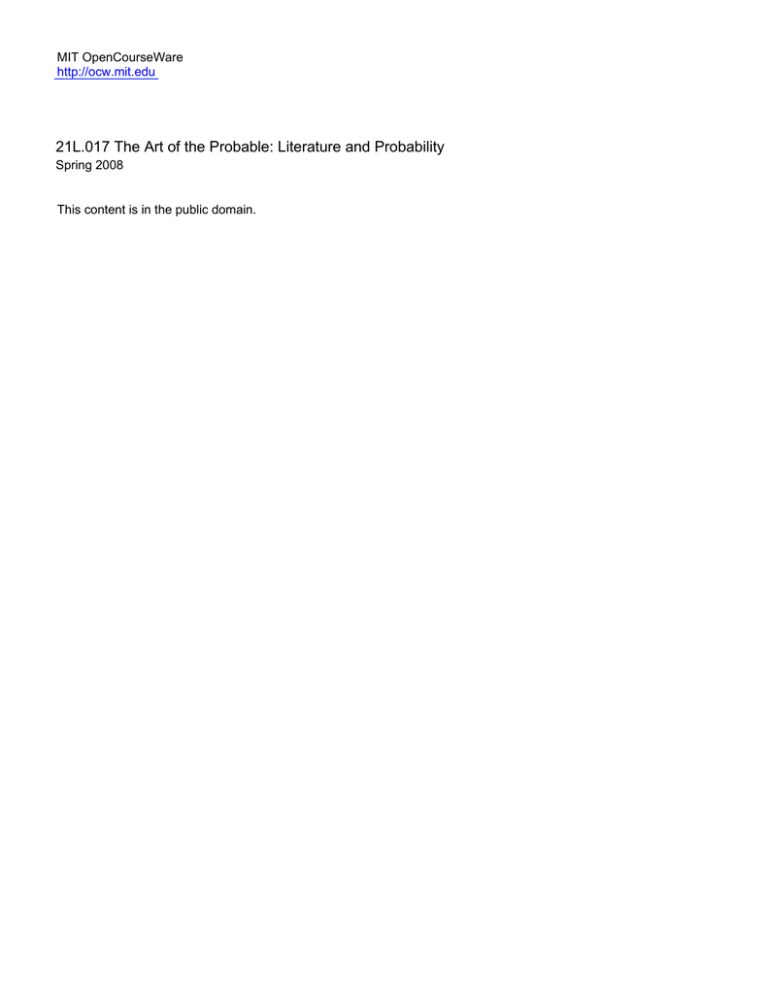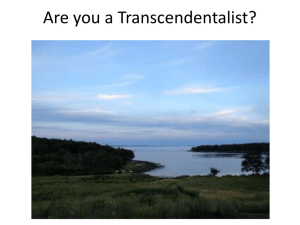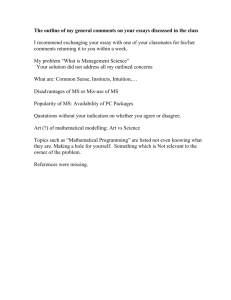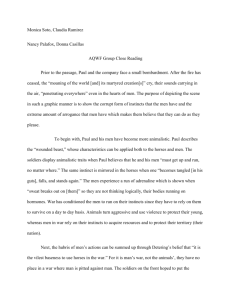21L.017 The Art of the Probable: Literature and Probability MIT OpenCourseWare
advertisement

MIT OpenCourseWare http://ocw.mit.edu 21L.017 The Art of the Probable: Literature and Probability Spring 2008 This content is in the public domain. Descent of Man [ 1871 ] by Charles Darwin [ 1809 - 1882 ] Excerpts from Chapter XXI - General Summary and Conclusion (excerpts abridged and elided for the sake of continuity) The main conclusion here arrived at, and now held by many naturalists who are well competent to form a sound judgment is that man is descended from some less highly organised form. The grounds upon which this conclusion rests will never be shaken, for the close similarity between man and the lower animals in embryonic development, as well as in innumerable points of structure and constitution, both of high and of the most trifling importance,- the rudiments which he retains, and the abnormal reversions to which he is occasionally liable,- are facts which cannot be disputed. By considering the embryological structure of man,- the homologies which he presents with the lower animals,- the rudiments which he retains,- and the reversions to which he is liable, we can partly recall in imagination the former condition of our early progenitors; and can approximately place them in their proper place in the zoological series. We thus learn that man is descended from a hairy, tailed quadruped, probably arboreal in its habits, and an inhabitant of the Old World. The high standard of our intellectual powers and moral disposition is the greatest difficulty which presents itself, after we have been driven to this conclusion on the origin of man. But every one who admits the principle of evolution, must see that the mental powers of the higher animals, which are the same in kind with those of man, though so different in degree, are capable of advancement. Thus the interval between the mental powers of one of the higher apes and of a fish, or between those of an ant and scale-insect, is immense; yet their development does not offer any special difficulty; for with our domesticated animals, the mental faculties are certainly variable, and the variations are inherited. No one doubts that they are of the utmost importance to animals in a state of nature. Therefore the conditions are favourable for their development through natural selection. The same conclusion may be extended to man; the intellect must have been all-important to him, even at a very remote period, as enabling him to invent and use language, to make weapons, tools, traps, &c., whereby with the aid of his social habits, he long ago became the most dominant of all living creatures. A great stride in the development of the intellect will have followed, as soon as the half-art and half-instinct of language came into use; for the continued use of language will have reacted on the brain and produced an inherited effect; and this again will have reacted on the improvement of language. The higher intellectual powers of man, such as those of ratiocination, abstraction, self-consciousness, &c., probably follow from the continued improvement and exercise of the other mental faculties. The development of the moral qualities is a more interesting problem. The foundation lies in the social instincts, including under this term the family ties. These instincts are highly complex, and in the case of the lower animals give special tendencies towards certain definite actions; but the more important elements are love, and the distinct emotion of sympathy. Animals endowed with the social instincts take pleasure in one another's company, warn one another of danger, defend and aid one another in many ways. These instincts do not extend to all the individuals of the species, but only to those of the same community. As they are highly beneficial to the species, they have in all probability been acquired through natural selection. A moral being is one who is capable of reflecting on his past actions and their motives- of approving of some and disapproving of others; and the fact that man is the one being who certainly deserves this designation, is the greatest of all distinctions between him and the lower animals. As I have endeavoured to shew, the moral sense follows, firstly, from the enduring and ever-present nature of the social instincts; secondly, from man's appreciation of the approbation and disapprobation of his fellows; and thirdly, from the high activity of his mental faculties, with past impressions extremely vivid; and in 1 these latter respects he differs from the lower animals. Owing to this condition of mind, man cannot avoid looking both backwards and forwards, and comparing past impressions. Hence after some temporary desire or passion has mastered his social instincts, he reflects and compares the now weakened impression of such past impulses with the ever-present social instincts; and he then feels that sense of dissatisfaction which all unsatisfied instincts leave behind them, he therefore resolves to act differently for the future, and this is conscience. Any instinct, permanently stronger or more enduring than another, gives rise to a feeling which we express by saying that it ought to be obeyed. A pointer dog, if able to reflect on his past conduct, would say to himself, I ought (as indeed we say of him) to have pointed at that hare and not have yielded to the passing temptation of hunting it. Social animals are impelled partly by a wish to aid the members of their community in a general manner, but more commonly to perform certain definite actions. Man is impelled by the same general wish to aid his fellows; but has few or no special instincts. He differs also from the lower animals in the power of expressing his desires by words, which thus become a guide to the aid required and bestowed. The motive to give aid is likewise much modified in man: it no longer consists solely of a blind instinctive impulse, but is much influenced by the praise or blame of his fellows. The appreciation and the bestowal of praise and blame both rest on sympathy; and this emotion, as we have seen, is one of the most important elements of the social instincts. Sympathy, though gained as an instinct, is also much strengthened by exercise or habit. As all men desire their own happiness, praise or blame is bestowed on actions and motives, according as they lead to this end; and as happiness is an essential part of the general good, the greatest-happiness principle indirectly serves as a nearly safe standard of right and wrong. As the reasoning powers advance and experience is gained, the remoter effects of certain lines of conduct on the character of the individual, and on the general good, are perceived; and then the self-regarding virtues come within the scope of public opinion, and receive praise, and their opposites blame. But with the less civilised nations reason often errs, and many bad customs and base superstitions come within the same scope, and are then esteemed as high virtues, and their breach as heavy crimes. The moral nature of man has reached its present standard, partly through the advancement of his reasoning powers and consequently of a just public opinion, but especially from his sympathies having been rendered more tender and widely diffused through the effects of habit, example, instruction, and reflection. It is not improbable that after long practice virtuous tendencies may be inherited. With the more civilised races, the conviction of the existence of an all-seeing Deity has had a potent influence on the advance of morality. Ultimately man does not accept the praise or blame of his fellows as his sole guide, though few escape this influence, but his habitual convictions, controlled by reason, afford him the safest rule. His conscience then becomes the supreme judge and monitor. Nevertheless the first foundation or origin of the moral sense lies in the social instincts, including sympathy; and these instincts no doubt were primarily gained, as in the case of the lower animals, through natural selection. The belief in God has often been advanced as not only the greatest, but the most complete of all the distinctions between man and the lower animals. It is impossible to maintain that this belief is innate or instinctive in man. On the other hand a belief in all-pervading spiritual agencies seems to be universal; and apparently follows from a considerable advance in man's reason, and from a still greater advance in his faculties of imagination, curiosity and wonder. I am aware that the assumed instinctive belief in God has been used by many persons as an argument for His existence. But this is a rash argument, as we should thus be compelled to believe in the existence of many cruel and malignant spirits, only a little more powerful than man; for the belief in them is far more general than in a beneficent Deity. The idea of a universal and beneficent Creator does not seem to arise in the mind of man, until he has been elevated 2 by long-continued culture. I am aware that the conclusions arrived at in this work will be denounced by some as highly irreligious; but he who denounces them is bound to shew why it is more irreligious to explain the origin of man as a distinct species by descent from some lower form, through the laws of variation and natural selection, than to explain the birth of the individual through the laws of ordinary reproduction. The birth both of the species and of the individual are equally parts of that grand sequence of events, which our minds refuse to accept as the result of blind chance. The understanding revolts at such a conclusion, whether or not we are able to believe that every slight variation of structure,- the union of each pair in marriage, the dissemination of each seed,- and other such events, have all been ordained for some special purpose. The belief in the power of sexual selection rests chiefly on the following considerations. Certain characters are confined to one sex; and this alone renders it probable that in most cases they are connected with the act of reproduction. In innumerable instances these characters are fully developed only at maturity, and often during only a part of the year, which is always the breeding-season. The males (passing over a few exceptional cases) are the more active in courtship; they are the better armed, and are rendered the more attractive in various ways. It is to be especially observed that the males display their attractions with elaborate care in the presence of the females; and that they rarely or never display them excepting during the season of love. It is incredible that all this should be purposeless. Lastly we have distinct evidence with some quadrupeds and birds, that the individuals of one sex are capable of feeling a strong antipathy or preference for certain individuals of the other sex. Bearing in mind these facts, and the marked results of man's unconscious selection, when applied to domesticated animals and cultivated plants, it seems to me almost certain that if the individuals of one sex were during a long series of generations to prefer pairing with certain individuals of the other sex, characterised in some peculiar manner, the offspring would slowly but surely become modified in this same manner. I have not attempted to conceal that, excepting when the males are more numerous than the females, or when polygamy prevails, it is doubtful how the more attractive males succeed in leaving a large number of offspring to inherit their superiority in ornaments or other charms than the less attractive males; but I have shewn that this would probably follow from the females,- especially the more vigorous ones, which would be the first to breed,- preferring not only the more attractive but at the same time the more vigorous and victorious males. Although we have some positive evidence that birds appreciate bright and beautiful objects, as with the bower-birds of Australia, and although they certainly appreciate the power of song, yet I fully admit that it is astonishing that the females of many birds and some mammals should be endowed with sufficient taste to appreciate ornaments, which we have reason to attribute to sexual selection; and this is even more astonishing in the case of reptiles, fish, and insects. Nevertheless I know of no fact in natural history more wonderful than that the female Argus pheasant should appreciate the exquisite shading of the ball-and-socket ornaments and the elegant patterns on the wing-feather of the male. He who thinks that the male was created as he now exists must admit that the great plumes, which prevent the wings from being used for flight, and which are displayed during courtship and at no other time in a manner quite peculiar to this one species, were given to him as an ornament. If so, he must likewise admit that the female was created and endowed with the capacity of appreciating such ornaments. I differ only in the conviction that the male Argus pheasant acquired his beauty gradually, through the preference of the females during many generations for the more highly ornamented males; the aesthetic capacity of the females having been advanced through exercise or habit, just as our own taste is gradually improved. In the male through the fortunate chance of a few feathers being left unchanged, we can distinctly trace how 3 simple spots with a little fulvous shading on one side may have been developed by small steps into the wonderful ball-and-socket ornaments; and it is probable that they were actually thus developed. He who admits the principle of sexual selection will be led to the remarkable conclusion that the nervous system not only regulates most of the existing functions of the body, but has indirectly influenced the progressive development of various bodily structures and of certain mental qualities. Courage, pugnacity, perseverance, strength and size of body, weapons of all kinds, musical organs, both vocal and instrumental, bright colours and ornamental appendages, have all been indirectly gained by the one sex or the other, through the exertion of choice, the influence of love and jealousy, and the appreciation of the beautiful in sound, colour or form; and these powers of the mind manifestly depend on the development of the brain. Man scans with scrupulous care the character and pedigree of his horses, cattle, and dogs before he matches them; but when he comes to his own marriage he rarely, or never, takes any such care. He is impelled by nearly the same motives as the lower animals, when they are left to their own free choice, though he is in so far superior to them that he highly values mental charms and virtues. On the other hand he is strongly attracted by mere wealth or rank. Yet he might by selection do something not only for the bodily constitution and frame of his offspring, but for their intellectual and moral qualities. Both sexes ought to refrain from marriage if they are in any marked degree inferior in body or mind; but such hopes are Utopian and will never be even partially realised until the laws of inheritance are thoroughly known. Everyone does good service, who aids towards this end. When the principles of breeding and inheritance are better understood, we shall not hear ignorant members of our legislature rejecting with scorn a plan for ascertaining whether or not consanguineous marriages are injurious to man. The advancement of the welfare of mankind is a most intricate problem: all ought to refrain from marriage who cannot avoid abject poverty for their children; for poverty is not only a great evil, but tends to its own increase by leading to recklessness in marriage. On the other hand, as Mr. Galton has remarked, if the prudent avoid marriage, whilst the reckless marry, the inferior members tend to supplant the better members of society. Man, like every other animal, has no doubt advanced to his present high condition through a struggle for existence consequent on his rapid multiplication; and if he is to advance still higher, it is to be feared that he must remain subject to a severe struggle. Otherwise he would sink into indolence, and the more gifted men would not be more successful in the battle of life than the less gifted. Hence our natural rate of increase, though leading to many and obvious evils, must not be greatly diminished by any means. There should be open competition for all men; and the most able should not be prevented by laws or customs from succeeding best and rearing the largest number of offspring. Important as the struggle for existence has been and even still is, yet as far as the highest part of man's nature is concerned there are other agencies more important. For the moral qualities are advanced, either directly or indirectly, much more through the effects of habit, the reasoning powers, instruction, religion, &c., than through natural selection; though to this latter agency may be safely attributed the social instincts, which afforded the basis for the development of the moral sense. The main conclusion arrived at in this work, namely, that man is descended from some lowly organised form, will, I regret to think, be highly distasteful to many. But there can hardly be a doubt that we are descended from barbarians. For my own part I would as soon be descended from that heroic little monkey, who braved his dreaded enemy in order to save the life of his keeper, or from that old baboon, who descending from the mountains, carried away in triumph his young comrade from a crowd of astonished dogs- as from a savage who delights to torture his enemies, offers up bloody sacrifices, practices infanticide without remorse, treats his wives like slaves, knows no decency, and is haunted by the grossest superstitions. 4 Man may be excused for feeling some pride at having risen, though not through his own exertions, to the very summit of the organic scale; and the fact of his having thus risen, instead of having been aboriginally placed there, may give him hope for a still higher destiny in the distant future. But we are not here concerned with hopes or fears, only with the truth as far as our reason permits us to discover it; and I have given the evidence to the best of my ability. We must, however, acknowledge, as it seems to me, that man with all his noble qualities, with sympathy which feels for the most debased, with benevolence which extends not only to other men but to the humblest living creature, with his god-like intellect which has penetrated into the movements and constitution of the solar system- with all these exalted powers- Man still bears in his bodily frame the indelible stamp of his lowly origin. 5


![Descent of Man [ 1871 ]](http://s2.studylib.net/store/data/013607767_1-bcfde370481537c6539508991dee61de-300x300.png)


